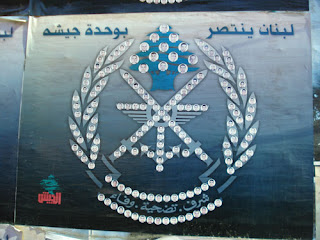There are several media campaigns being launched by the Lebanese Forces and some Phalangist elements. It is big showdown before legislative elections. The slogans and images leaves one to ponder. Take this one for example that does not look like it is sponsored by the Lebanese Forces or else they would have made sure to have their logo on it:
“We are the Lebanese Resistance”
What the hell are they talking about? It reminds me of the type of confrontational stance we had when we were kids that goes something like this:
– I was the first to play Lego
– No I was the first!
– My dad is the strongest
– No MY dad is the strongest
The “We” is an implicit ‘answer’ to Hizbullah they think are saying: “NO it is we who are the TRUE Lebanese resistance”. Pitiful to say the least. But in a way it is true, until very recently Hizbullah never claimed to be a “Lebanese resistance”, but an “Islamic resistance in Lebanon”. I won’t digress on the ambiguities of such statements especially that today Hizbullah forcefully argues that its resistance is ‘nationalist’.
Moving on to an explicit LF one:
This billboard is about the announcement of a mass that will be given in the memory of ‘the martyrs of the Lebanese Forces”. The top liner says: “we were brothers in martyrdom, let’s be brothers in life”. So I’m still trying to figure out what they mean by “we” but if it refers to the martyrs of Hizbullah then it is truly interesting to see how this martyrdom language has picked up like fire across all parties, especially such antagonistic ones as the LF and Hizb.
It is quite interesting to see that historically when it was Hizbullah who emerged in re-action to Lebanese Forces practices all around the country (in the 80s), now the reverse: it is LF’s discourse that is overclouded by representations of Hizbullah and it seems to ‘speak’ to them.
On another note, martyrdom has become a category as important as sect to identify with a specific imaginary collective in this tiny little geography called Lebanon. If you want to be politically relevant (or named) then you better show some martyrs. In this case, the legitimating instance is the Maronite Patriarch Nasrallah Boutros Sfeir (good job sanctifying the LF) who’s going to give the mass in question.
So in a way the use of the dead for the purpose of distinguishing, separating, categorizing, and naming, is ironically used to reach out to the ‘other’. That’s the sectarianism system at its best: because we are different we need to reach out to each other. And also: Even in death when we resemble ourselves, what we symbolize by being dead permits us to live separate lives.









